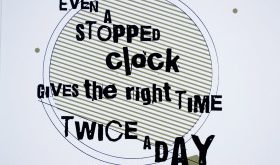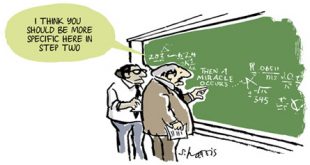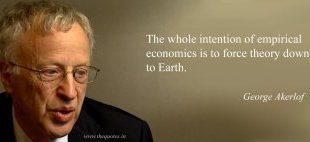Factor analysis — like telling time with a stopped clock Exploratory factor analysis exploits correlations to summarize data, and confirmatory factor analysis — stuff like testing that the right partial correlations vanish — is a prudent way of checking whether a model with latent variables could possibly be right. What the modern g-mongers do, however, is try to use exploratory factor analysis to uncover hidden causal structures. I am very, very interested...
Read More »Reasons to reject the standard rationality axioms in economics
Reasons to reject the standard rationality axioms in economics Those axioms—and you can find a whole series of people from Pareto onwards who make the same argument—come from economists’ introspection and what they think is necessary for their work, not from observation of what people are doing. Some of these axioms seem natural, at least at first sight. For example, transitivity seems a natural idea—if you prefer A to B and B to C, you also prefer A to C....
Read More »Edward Snowden — unbroken and unconquerable
Edward Snowden — unbroken and unconquerable [embedded content] This one is for you. Bravest of the brave. Never give in. Never give up. Advertisements
Read More »Modern macroeconomics — a walk down a blind alley
Modern macroeconomics — a walk down a blind alley I would say that macroeconomic theory has gone down a blind alley in the sense that we have locked onto a particular model: general equilibrium. But it is not really general equilibrium, I mean, it is a one-man model! In particular, it has become mathematically sophisticated without representing the fundamental features of the macro-economy. So I would say that people like Kydland and Prescott, and so forth,...
Read More »Solving the fundamental problem of decision theory (wonkish)
Solving the fundamental problem of decision theory (wonkish) Currently the dominant formalism for treating the [general gamble] problem is utility theory. Utility theory was born out of the failure of the following behavioral null model: individuals were assumed to optimize changes in the expectation values of their wealth. We argue that this null model is a priori a bad starting point because the expectation value of wealth does not generally reflect what...
Read More »Hedersförtryck
Problem kring hedersvåld och hedersförtryck har diskuterats länge. Det uppmärksammade mordet på Fadime Sahindal för femton år sedan blev något av ett startskott. Dessvärre är det lite som tyder på att de ansträngningar som gjorts haft någon påtaglig effekt. Istället förvärras problemet. I en rapport 2014 som togs fram av Carin Götblad, för närvarande chef för Polisregion Mitt, bedömdes omkring 100 000 svenska ungdomar upp till 25 år leva med “hedersrelaterade begränsningar”....
Read More »Cleaning p-values
The one place that preregistration is really needed … is if you want clean p-values. A p-value is very explicitly a statement about how you would’ve analyzed the data, had they come out differently. Sometimes when I’ve criticized published p-values on the grounds of forking paths, the original authors have fought back angrily, saying how unfair it is for me to first make an assumption about what they would’ve done under different conditions, and then make conclusions based on...
Read More »Has economics really become an empirical science?
Has economics really become an empirical science? As I see it, a rational predictor should use a combination of theory and empirics. But theory should also be informed by data – there are lots of theories, and in general they can’t all apply to the same situation, so you need evidence to tell you which one(s) to use. So a rational predictor’s predictions should always be tied as closely as possible to empirical evidence. Discounting empirical evidence …...
Read More »Kenneth Arrow (1921-2017)
A democratic polity is supposed to be based on egalitarian distribution of political power. In a system where virtually all resources are available for a price, economic power can be translated into political power by channels too obvious for mention. In a capitalist society, economic power is very unequally distributed, and hence democratic government is inevitably something of a sham. In a sense, the maintained ideal of democracy makes matters worse, for it adds the tensions...
Read More »Where modern economics went wrong
Where modern economics went wrong [embedded content] Many economists have over time tried to diagnose what’s the problem behind the ‘intellectual poverty’ that characterizes modern mainstream economics. Rationality postulates, rational expectations, market fundamentalism, general equilibrium, atomism, over-mathematisation are some of the things one have been pointing at. But although these assumptions/axioms/practices are deeply problematic, they are mainly...
Read More » Lars P. Syll
Lars P. Syll









